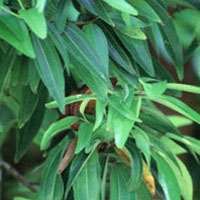Fit and Fast Recipes
Cinnamon
 © Steven Foster
© Steven FosterParts Used & Where Grown
Most people are familiar with the sweet but pungent taste of the oil, powder, or sticks of bark from the cinnamon tree. Cinnamon trees grow in a number of tropical areas, including parts of India, China, Madagascar, Brazil, and the Caribbean.
- Reliable and relatively consistent scientific data showing a substantial health benefit.
- Contradictory, insufficient, or preliminary studies suggesting a health benefit or minimal health benefit.
- For an herb, supported by traditional use but minimal or no scientific evidence. For a supplement, little scientific support.
Our proprietary “Star-Rating” system was developed to help you easily understand the amount of scientific support behind each supplement in relation to a specific health condition. While there is no way to predict whether a vitamin, mineral, or herb will successfully treat or prevent associated health conditions, our unique ratings tell you how well these supplements are understood by the medical community, and whether studies have found them to be effective for other people.
For over a decade, our team has combed through thousands of research articles published in reputable journals. To help you make educated decisions, and to better understand controversial or confusing supplements, our medical experts have digested the science into these three easy-to-follow ratings. We hope this provides you with a helpful resource to make informed decisions towards your health and well-being.
This supplement has been used in connection with the following health conditions:
| Used for | Amount | Why |
|---|---|---|
Metabolic Syndrome | 1 to 3 grams daily | Cinnamon has been shown to improve all aspects of metabolic syndrome. |
Type 2 Diabetes | 1 to 3 grams daily | Cinnamon may improve glucose levels in people with type 2 diabetes. |
Colic | Refer to label instructions | Cinnamon is a gas-relieving herb used in traditional medicine to treat colic. It is generally given by healthcare professionals as teas or decoctions to the infant. |
Indigestion, Heartburn, and Low Stomach Acidity | Refer to label instructions | Cinnamon is a gas-relieving herb that may be helpful in calming an upset stomach. |
Menorrhagia | Refer to label instructions | Cinnamon has been used historically for the treatment of various menstrual disorders, including heavy menstruation. |
Yeast Infection | Refer to label instructions | The essential oil of cinnamon contains various chemicals that are believed to be responsible for cinnamon’s antifungal effects. |
Traditional Use (May Not Be Supported by Scientific Studies)
Cinnamon is an ancient herbal medicine mentioned in Chinese texts as long ago as 4,000 years. It has a broad range of historical uses in different cultures, including the treatment of diarrhea, rheumatism, and certain menstrual disorders.1
Copyright © 2026 TraceGains, Inc. All rights reserved.
Learn more about TraceGains, the company.
The information presented by TraceGains is for informational purposes only. It is based on scientific studies (human, animal, or in vitro), clinical experience, or traditional usage as cited in each article. The results reported may not necessarily occur in all individuals. Self-treatment is not recommended for life-threatening conditions that require medical treatment under a doctor's care. For many of the conditions discussed, treatment with prescription or over the counter medication is also available. Consult your doctor, practitioner, and/or pharmacist for any health problem and before using any supplements or before making any changes in prescribed medications. Information expires December 2026.









